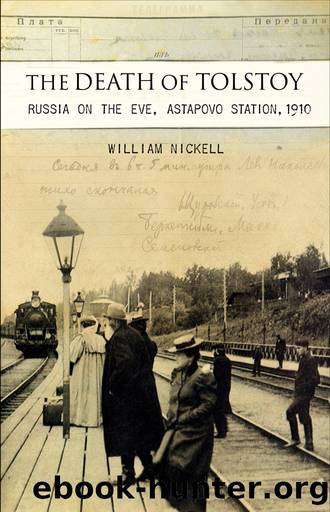The Death of Tolstoy by Nickell William

Author:Nickell, William
Language: eng
Format: epub
ISBN: 978-0-8014-6254-2
Publisher: Cornell University Press
19. The crowd on their knees as Tolstoyâs coffin is lowered into his grave, November 9, 1910. Photograph by A. I. Savel'ev.
The ambiguity of Tolstoyâs final narrative was consequential to the political sphere, just as it had been to the religious one. Nowhere were alternate endings to that narrative more hotly and voluminously contested than in the political arena of late 1910. Though Tolstoy was not overtly affiliated with any particular political party or program, and was largely antagonistic to the political process itself, he was seen by authorities as a sort of revolutionary yeast that could be absorbed by any number of dubious political organizations and give rise to new hopes and demands on the part of a restless public. This concern was particularly significant at the moment of his death, when the public would have license to gather in his name and might use the opportunity to advance antigovernment agendas. This property was not unique to Tolstoy but had over the preceding half-century become characteristic of leaders of the democratic intelligentsia, the funerals of whom had repeatedly served as focal points of political turmoil and social unrest.
What followed the funeral was not so typical, however, and can be tied more specifically to Tolstoy. In his last days Tolstoy had moved to bring his life into closer accord with his ethical systemâone that had destabilized the foundations of the aristocratic family, autocratic politics, and patriarchal Orthodoxy. When, in late October 1910, he set off from his family home, the narrative of emancipation which the public read into the act was, to the horror of the authorities, a compelling representation of abandonment of traditional, patriarchal values. The specific political context of Russia in the period after the 1905 Revolution is also significant. It is no accident that in his political afterlife Tolstoy continued to threaten the political status quo as a spokesman against the death penalty. Capital punishment had not been common in Russia before 1905 but came into widespread use under Stolypin in the years afterward. Tolstoy, a vocal opponent of this practice, had promised in a 1909 article to speak against it to his dying breath. His fulfillment of this promise (he completed a short piece on the question during his final journey) gave demonstrators a rallying cry with which to overtly politicize his death and sharpened the response of the authorities to the public sentiments and reactions that it elicited.
The complex behaviors of the government and public following Tolstoyâs death mixed honest political emotion and belief with a great deal of posturing and dissimulation, as both Right and Left tried to turn political sympathies on the axis of Tolstoyâs death. The government tried to exchange thinly disguised gestures of grief for favorable public opinion, while many who shared Tolstoyâs disdain for Orthodox ritual passionately condemned the official refusal to allow church services for him. The political battle over Tolstoyâs grave became a complicated chess match, in which the endgame was often obscured behind various sacrifices and exchanges,
Download
This site does not store any files on its server. We only index and link to content provided by other sites. Please contact the content providers to delete copyright contents if any and email us, we'll remove relevant links or contents immediately.
Machine Learning at Scale with H2O by Gregory Keys | David Whiting(4281)
Never by Ken Follett(3917)
Harry Potter and the Goblet Of Fire by J.K. Rowling(3834)
Unfinished: A Memoir by Priyanka Chopra Jonas(3361)
Fairy Tale by Stephen King(3353)
The Man Who Died Twice by Richard Osman(3055)
Will by Will Smith(2891)
Rationality by Steven Pinker(2340)
It Starts With Us (It Ends with Us #2) by Colleen Hoover(2317)
Can't Hurt Me: Master Your Mind and Defy the Odds - Clean Edition by David Goggins(2309)
The Dark Hours by Michael Connelly(2289)
The Storyteller by Dave Grohl(2211)
Friends, Lovers, and the Big Terrible Thing by Matthew Perry(2208)
The Dawn of Everything: A New History of Humanity by David Graeber & David Wengrow(2177)
The Becoming by Nora Roberts(2177)
The Stranger in the Lifeboat by Mitch Albom(2104)
Cloud Cuckoo Land by Anthony Doerr(2080)
Love on the Brain by Ali Hazelwood(2046)
Einstein: His Life and Universe by Walter Isaacson(1997)
